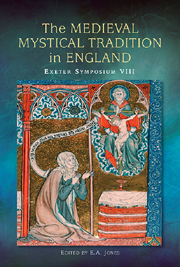 The Medieval Mystical Tradition in England
The Medieval Mystical Tradition in England Book contents
- Frontmatter
- Contents
- Lists of Diagrams and Figures
- List of Contributors
- Abbreviations
- Introduction
- The Colours of Contemplation: Less Light on Julian of Norwich
- Behold Not the Cloud of Experience
- Walter Hilton on the Gift of Interpretation of Scripture
- Numeracy and Number in The Book of Margery Kempe
- Religious Mystical Mothers: Margery Kempe and Caterina Benincasa
- Authority and Exemplarity in Henry Suso and Richard Rolle
- Mortifying the Mind: Asceticism, Mysticism and Oxford, Bodleian Library, MS Douce 114
- The Meditaciones of the Monk of Farne
- Envisioning Reform: A Revelation of Purgatory and Anchoritic Compassioun in the Later Middle Ages
- Walton's Heavenly Boece and the Devout Translation of Transcendence: O Qui Perpetua Pietised
- Reformist Devotional Reading: The Pore Caitif in British Library, MS Harley 2322
- Richard Whytford, The Golden Epistle, and the Mixed Life Audience
- Afterword: Future Prospects
- Index
Walton's Heavenly Boece and the Devout Translation of Transcendence: O Qui Perpetua Pietised
Published online by Cambridge University Press: 05 July 2013
- Frontmatter
- Contents
- Lists of Diagrams and Figures
- List of Contributors
- Abbreviations
- Introduction
- The Colours of Contemplation: Less Light on Julian of Norwich
- Behold Not the Cloud of Experience
- Walter Hilton on the Gift of Interpretation of Scripture
- Numeracy and Number in The Book of Margery Kempe
- Religious Mystical Mothers: Margery Kempe and Caterina Benincasa
- Authority and Exemplarity in Henry Suso and Richard Rolle
- Mortifying the Mind: Asceticism, Mysticism and Oxford, Bodleian Library, MS Douce 114
- The Meditaciones of the Monk of Farne
- Envisioning Reform: A Revelation of Purgatory and Anchoritic Compassioun in the Later Middle Ages
- Walton's Heavenly Boece and the Devout Translation of Transcendence: O Qui Perpetua Pietised
- Reformist Devotional Reading: The Pore Caitif in British Library, MS Harley 2322
- Richard Whytford, The Golden Epistle, and the Mixed Life Audience
- Afterword: Future Prospects
- Index
Summary
For all its unpacey ponderousness, when Chaucer's Boece renders passages of De consolatione philosophiae dealing with the ascent of the soul towards divine light and the transcendent Good, it reveals a delicate theological intelligence consonant with the devotional temper of contemporary mainstream piety. The maker of the Boke of Coumfort, an early-fifteenth-century Middle English prose version of book I of De consolatione drawing on Chaucer, was likewise willing to turn the Latin text to a more devotional end than was the case in the original. Nowhere is the pious recharging of the source more decisively advertised in both these vernacular versions than in their re-presenting, at the very outset of the work, of Lady Philosophy herself. In the original we read that on the hem of her gown are embroidered two symbolic Greek letters: ‘Π Grecum, in suppremo margine Θ’ (‘a Greek pi, and in the top border a theta’). These uncontroversially stand for Practica and Theoretica – practical and theoretical (that is, speculative) philosophy. But when Chaucer gets to this passage he puts a radically different interpretation on those sartorial letters. Following Jean de Meun's Livres de confort de philosophie, he glosses the Greek letters not just with their counterparts from the Latin alphabet, but also with a telling expositio sententie that equates them with the active and contemplative lives respectively:
In the nethereste hem or bordure of thise clothes, men redden ywoven in a Grekyssh ‘P’, that syngnifieth the lyf actyf; and aboven that lettre in the heyeste bordure a Grekyssh ‘T’, that singnifieth the lyf contemplatyf.
(lines 16-19)- Type
- Chapter
- Information
- The Medieval Mystical Tradition in EnglandPapers Read at Charney Manor, July 2011 [Exeter Symposium 8], pp. 157 - 176Publisher: Boydell & BrewerPrint publication year: 2013
